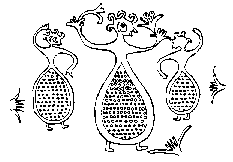
Home
Deep in Time - Poetry
About Cora
Holidays in Crete
Workshops in UK
Calendar of Events
Send Email to Cora
Why Potnian? |
 |
I have long been aware that the term Minoan, used first by Sir Arthur Evans to describe the civilisation of ancient Crete he began discovering in 1900, was a misnomer. If there was ever a King Minos in Crete it was after the natural disaster destroyed that civilisation around 1450 BC. It is now clearer than ever that during the preceding centuries, the periods Evans called early, middle and late Minoan, there was no king or male ruler in the land: in fact there seems to have been no major ruler at all. The so called temple palaces, such as great Knossos, have been shown to be temples of the Goddess, designed for rituals of initiation and great festivals of dance and seasonal ritual, all presided over not by a royal family, but by a shamanic priesthood, the most important of whom were female.
The culture they presided over was one of the utmost grace, aesthetic and technical sophistication, and seems to have been peaceful. Their incomparable art reflected a joy in life and nature. Their calendric and astrological skills were highly advanced, as was their architecture and engineering. The name of the Goddess found on the earliest script deciphered at Knossos was Potnia, translated as Our Lady, and it was She to whom the offerings to the temple were made. This was the one place in the whole of Europe where the civilisation of the Goddess survived the neolithic era and progressed into the Bronze Age. Here the Goddess survived and a peaceful, artistic, Goddess loving people spread their influence through many neighbouring countries long since turned barbaric under the warlike influence of northern invaders.
I realised this year while in Crete that I could no longer be part of the collusion that calls a Goddess culture by the name of a later King, and that I would henceforth refer to the civilisation as Potnian. I further realised that this would involve me in committing myself to Her service by finding ways to live as a modern Priestess of Potnia. This possibility opened to me by finding myself working alongside my friend Rose, who is a Priestess of Avalon. Suddenly it feels it is time for women to take their place and power and claim status in the religious realm, from which we have long been excluded. Not by asking for small power in established religions, but by asserting our own sense of spirituality, which is both very old indeed and very new, both informed and unformed.
We will need all our humour, wisdom, courage, mutual support, and the support of our brothers, but the time has come. We need to know all our rhythms and dance all our dances.
The Goddess is returning through us all.
Blessed be.
Cora. June 2000.
(Illustration from a Potnian sealstone of dancing bee Goddesses.)